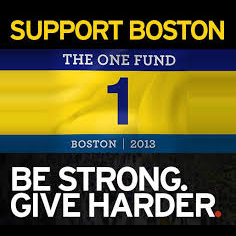My View on Boston’s Marathon Bombings
 I was in Washington that day, but the blasts exploding three blocks away from my old neighborhood looked immense. And so the questions began. How could only three people have died? Why did it happen? What do we do now? And did it make sense that two guys were pursued by thousands of police, as hundreds of thousands hunkered down even miles away?
I was in Washington that day, but the blasts exploding three blocks away from my old neighborhood looked immense. And so the questions began. How could only three people have died? Why did it happen? What do we do now? And did it make sense that two guys were pursued by thousands of police, as hundreds of thousands hunkered down even miles away?
These bombings were a personal attack, executed against as benevolent an event as there is, one which welcomes the world to Boston. Boston is perhaps the world’s smallest world city. 8 year old Martin Richard was one of the few who died at the finish line, an every first responder on the fire truck who came to his aid had a family connection to him. He was also in a ski class with one of the developers in my firm. In the age of Facebook, no fatality is as distant as it seems, especially in Boston.
Having this attack at the finish line of the Marathon meant a huge number of first responders were already on-site to attend to the annual mass casualty of thousands of runners finishing their races. Several years ago, Boston issued tourniquet kits and training to first responders. Of the hundreds of survivors reached by first responders that Monday, none…zero would die. But just as improved medical care leaves more soldiers maimed bur fewer dead in our wars, the scale of injury increased even as deaths were limited.
In the community of agencies I admire, Small Army is a shop of great story tellers. Christian Williams is an art director there, and he and his girlfriend Caroline ran the race last year to raise money for cancer victims. They were in the finish line crowd this year. Their legs were shredded, and the skin was blown off most of Chirstian’s right hand. The hearts of everyone in our industry go out to them and the others who were injured or killed that day.
The charitable outpouring of friends, civic organizations, and individuals like Nick Reynolds and Chris Dobens, college students who have raised a half million to help victims through the ad hoc sale of shirts are huge bright spots. And what of the huge law enforcement response which followed?
Boston has had a series of disappointing high profile cases. The Gardner Heist, the Charles Stewart case, and our role as the origin of flights on 9/11. Deserved or not, this region carries a stain for having had a chance to prevent a portion of the failure and agony that was September 11th. Why such a muscular response two two guys and some homemade bombs? In part, an intense desire to get it right this time. And as we’ve learned in recent days, the attackers had started their trip from Boston to New York to continue bombing. It was as if the Hub had one more shot at getting Ground Hog Day right — and from aiding the wounded to pursuing the bombers, the Bostonians cowboyed-up.
I”m not sure that outsiders get this. Consider Nate Bell, a State Rep. in Arkansas made public remarks politicizing the situation as the largest manhunt in Boston history unfolded. I believe the quote was “Boston Liberals spent the night cowering in their homes wishing they had an AR-15 with a hi capacity magazine“. He then issued a fake apology noting that his timing was in opportune, but not apologizing for having been wrong in every resonate layer of the word.
Several of my friends were at least momentarily cowering in Watertown. Coworkers, and one of my guest lecturers in class this week all kept in touch by Facebook and Twitter as SWAT teams searched their yards, and in some cases their homes. “Was it overkill?”, I asked? “No way”, said one of my friends. “They were busy finding a guy who threw bombs in our neighborhood. We were being protected, and having heard the explosions, we were glad for it. A thousand more cops would have fit right in”
I doubt that any criminal process will satisfy our need to make sense of this, or to find a way for it to make us better and smarter. So, that leaves us each to make a personal response based on the our own perceptions and filters. In my case, I’m inclined to organize some first responder trainings. There is no more torturous feeling than being useless in a tragedy. And our decision to helpful rather than useless is onc we make daily, for weeks or years before a tragedy. The only good outcome I can imagine is that we can somehow become better, more empathetic, and ready to emulate the best of what we saw on April 15, 2013.
From tragedy, strength. There, someone say that in Latin, this could be the motto of our year.

 The future of digital experiences will be built by strategists who grasp the full array of emerging business, social, and technical models. Specialties in user experience, branding, application design, and data science are laying the foundation for richer user experiences and business models breakthrough products and revenue based marketing.
The future of digital experiences will be built by strategists who grasp the full array of emerging business, social, and technical models. Specialties in user experience, branding, application design, and data science are laying the foundation for richer user experiences and business models breakthrough products and revenue based marketing.